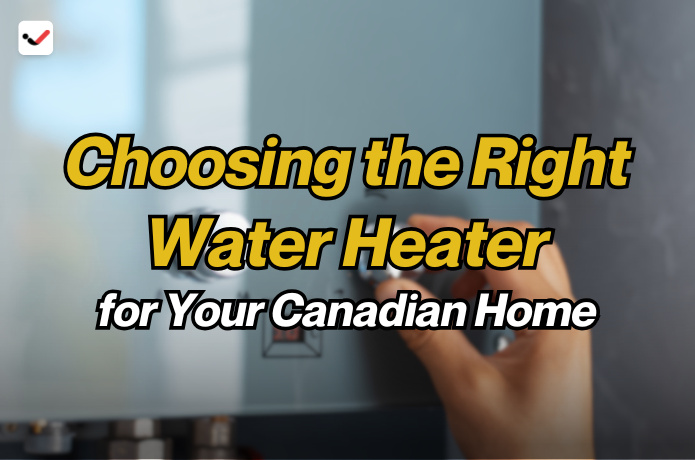Choosing the Right Water Heater for Your Canadian Home
Choosing the Right Water Heater for Your Canadian Home

Selecting the right water heater is crucial for ensuring comfort and efficiency in your Canadian home. With various options available, choosing a water heater that meets your needs can be challenging. A suitable water heater not only provides consistent hot water but also affects your energy bills and overall home efficiency. Understanding the different types of water heaters and considering factors specific to Canadian homes will help you make an informed decision.
In Canada, water heaters must handle the diverse climate conditions and energy demands. Factors like energy efficiency, size, installation costs, and maintenance requirements all play a significant role in selecting the best option. This article will explore different types of water heaters, considerations specific to Canadian homes, and best practices for installation to guide you in making the right choice.
Types of Water Heaters
Tankless Water Heaters: Also known as on-demand water heaters, tankless units heat water directly without using a storage tank. They provide hot water only when needed, which can lead to energy savings and lower utility bills. However, their flow rate may be limited, so they might not be suitable for large households with high hot water demands.
Conventional Storage Tank Water Heaters: These are the most common type, featuring a large tank that stores a reserve of hot water. They come in various sizes to suit different household needs. Although they are generally less expensive to purchase, they may have higher operating costs due to energy loss from keeping water hot in the tank.
Heat Pump Water Heaters: These units use electricity to move heat from the air or ground to heat water. They are highly energy-efficient and can significantly reduce energy costs. However, they require adequate space and work best in moderate climates, making them less suitable for extremely cold Canadian winters.
Solar Water Heaters: Utilizing solar panels to capture and convert sunlight into heat, solar water heaters are an eco-friendly option. They can greatly reduce energy bills and reliance on fossil fuels. Despite their benefits, they depend on sunny weather and may require a backup system for cloudy days or during winter.
Considerations for Canadian Homes
Energy Efficiency and Climate Considerations: Canadian homes experience varied climates, from mild to extremely cold temperatures. Choosing a water heater with high energy efficiency is essential to minimize heating costs and maintain consistent performance. For colder climates, units with better insulation and temperature resistance are crucial.
Size and Capacity Based on Household Needs: The size of the water heater should match the household's hot water usage. A larger tank or higher capacity unit may be needed for larger families or homes with high hot water demands. For tankless models, consider the flow rate and ensure it meets your household’s peak usage.
Cost of Installation and Operation: The initial cost of purchasing a water heater varies by type and size. Installation costs should also be factored in, as they can differ based on the complexity of the setup. Long-term operating costs, including energy consumption, should be evaluated to ensure the chosen unit is cost-effective over time.
Maintenance Requirements: Regular maintenance is vital for the longevity and efficiency of water heaters. Tankless models generally require less maintenance than conventional tanks but may need periodic descaling. Solar and heat pump water heaters may require specific care based on their technology.
Best Practices for Installation
Location and Space Considerations: The location of the water heater should allow for proper ventilation, access for maintenance, and efficient operation. Ensure there is enough space around the unit for air circulation and installation. For tankless heaters, consider the placement relative to water sources to minimize heat loss.
Professional Installation vs. DIY: While DIY installation can save money, professional installation is recommended to ensure compliance with local building codes and regulations. Professionals can also assess the best location and setup for optimal performance.
Building Code and Regulations Compliance: Adhering to local building codes and regulations is essential for safety and efficiency. These codes may dictate specific requirements for venting, drainage, and installation practices. Ensuring compliance helps avoid potential issues and guarantees that the unit operates as intended.
Choosing the right water heater for your Canadian home involves evaluating various types and considering factors specific to your needs and climate. By understanding the options available, including tankless, conventional, heat pump, and solar heaters, you can make an informed decision. Additionally, considering energy efficiency, size, costs, and maintenance will help you select a water heater that provides reliable performance and fits your budget.
Ultimately, making the right choice involves balancing your household’s hot water needs with the long-term costs and benefits of each type of water heater. With the right information and professional advice, you can ensure that your home remains comfortable and efficient year-round.

